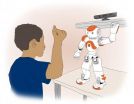(Press-News.org) A third of women who are given information about the chance of 'overdiagnosis' through the NHS breast screening programme may not fully understand the risks involved, according to research published in the British Journal of Cancer (BJC), today (Friday).
In a survey of around 2,200 women, Cancer Research UK scientists at University College London (UCL) found that 64 per cent felt they fully understood the information given about overdiagnosis – the chance that screening will pick up cancers that would never have gone on to cause any harm – by the National breast screening programme.
But information about overdiagnosis has only been included in the NHS breast screening invitation leaflets since late 2013, meaning that overdiagnosis is likely to be a new concept for many people.
Yet despite uncertainty over the information they were given, intentions to attend breast screening remained high, with only seven per cent of women saying they would be less likely to attend screening after receiving the overdiagnosis information. On the other hand, four per cent of women said they would be more likely to attend screening after receiving the information.
Study author, Dr Jo Waller, a researcher at the Health Behaviour Research Centre at UCL, said: "While there is clearly room for improvement, the information leaflet does appear to help some women make a decision about whether or not to have breast screening.
"But the study found that many women still struggle to understand the balance of benefits and harms linked to breast screening, so we need to find better ways to communicate the risks as well as the benefits."
Overdiagnosis happens because some breast cancers grow so slowly that it would take more than a lifetime for them to threaten a woman's health. For every life that is saved through screening, researchers estimate that around three women will be overdiagnosed with breast cancer, although there is presently no way of telling the difference between life-threatening cancers and cancers that are overdiagnosed, either at diagnosis or after treatment.
Sara Hiom, Cancer Research UK's director of early diagnosis, said: "We think it's vitally important for women to have clear information about breast screening, the balance of benefits and harms and the fact that they could be diagnosed with and treated for a cancer that might not have caused them harm.
"We are committed to providing quality information that can help women understand the harms and benefits of breast screening, and research like this can help us refine the information we offer to be sure that it is as helpful and understandable as possible.
"The concept of overdiagnosis is still very new for a lot of women because it has only been included in the NHS leaflets for a year. We hope that over time, people's understanding of this concept will increase as more and more women receive information explaining this risk of screening.
"Any woman invited for breast screening and worried about the risks of overdiagnosis can speak to our specialist cancer nurses on freephone 0808 800 4040."
INFORMATION:
For media enquiries please contact Flora Malein on 020 3469 8300 or, out-of-hours, the duty press officer on 07050 264 059.
Notes to Editors:
*Waller, J et al. A survey study of women's responses to information about overdiagnosis in breast cancer screening in Britain (2014) British Journal of Cancer. doi: 10.1038/bjc.2014.482
Some women still don't underststand 'overdiagnosis' risk in breast screening
2014-08-29
ELSE PRESS RELEASES FROM THIS DATE:
High dietary salt may worsen multiple sclerosis symptoms
2014-08-29
Previous research has indicated that salt may alter the autoimmune response, which is implicated in the development of multiple sclerosis (MS), but it is not clear if it has any direct effect on the course of the disease itself.
The researchers assessed the blood and urine samples of 70 people with the relapsing-remitting form of MS to check for levels of salt; a marker of inflammatory activity called creatinine; and vitamin D, low levels of which have been linked to the disease.
This group were asked to provide urine samples on three separate occasions over a period ...
Plain cigarette packs don't hurt small retailers or boost trade in illicit tobacco
2014-08-29
The findings suggest there is no evidence for these particular arguments against the policy, put forward by the tobacco industry, say the researchers.
Australia was the first country in the world to introduce standardised packaging for tobacco products in December 2012. New Zealand, Ireland, and the UK are currently considering similar legislation.
The researchers wanted to find out if the policy would deter people from buying their tobacco from small independent retailers, prompt a rise in the availability of cheap products sourced from Asia, and increase the use of ...
New model predicts patients with type 1 diabetes who will go on to develop major complications
2014-08-29
New research published in Diabetologia (the journal of the European Association for the Study of Diabetes) presents a new model for predicting which patients with type 1 diabetes will go on to develop major complications, through easily and routinely measured risk factors. The research is by Assistant Professor Sabita Soedamah-Muthu, Wageningen University, Netherlands, and colleagues.
To create the model, data were analysed from 1,973 participants with type 1 diabetes followed for seven years in the EURODIAB Prospective Complications Study, and strong prognostic factors ...
The Lancet: China-themed issue
2014-08-29
China's rapid emergence as a global power has coincided with a series of unprecedented challenges to Chinese people's health. The fifth China themed issue of The Lancet provides a picture of the complex health issues facing China, and looks at how better health outcomes for Chinese people can be achieved into the future.
In this issue, the journal highlights the dire consequences that urbanisation and increasing affluence are having on China's chronic disease burden. The journal also reports systematic and comprehensive assessments of China's health-care system and revamping ...
Study finds shortcomings in doctor-patient discussions about transplantation
2014-08-29
Highlights
When dialysis patients reported discussions about transplantation with clinicians, they had a nearly 3-fold increased likelihood of being listed for transplantation, but clinician-reported discussions did not increase a patient's likelihood of being listed.
In almost one-third of cases, clinicians reported that they had discussed transplantation with a particular dialysis patient, but the patient said that nobody had discussed it with them.
Washington, DC (August 28, 2014) — In a study of dialysis patients, those who reported that they had discussed ...
Complications of tube insertion in ears not worse for kids with cleft lip/palate
2014-08-28
Bottom Line: Children with cleft lip and/or palate (CLP) have no worse complications from ventilation tube (VT) insertion in their ears to treat otitis media with effusion (OME, a buildup of fluid in the ear) or acute otitis media (AOM, a common ear infection), two conditions which can result in hearing loss.
Author: Ian Smillie, M.R.C.S. Ed., of the Royal Hospital for Sick Children, Glasgow, Scotland, and colleagues.
Background: CLP is a common birth defect in children, occurring in 1 of 700 births. Optimizing hearing in children with CLP is important to avoid problems ...
Socially-assistive robots help kids with autism learn by providing personalized prompts
2014-08-28
LOS ANGELES - August 28, 2014: This week, a team of researchers from the USC Viterbi School of Engineering will share results from a pilot study on the effects of using humanoid robots to help children with autism practice imitation behavior in order to encourage their autonomy. Findings from the study, entitled "Graded Cueing Feedback in Robot-Mediated Imitation Practice for Children with Autism Spectrum Disorders," will be presented at the 23rd IEEE International Symposium on Robot and Human Interactive Communication (RO-MAN) conference in Edinburgh, Scotland, on Aug. ...
Flapping baby birds give clues to origin of flight
2014-08-28
How did the earliest birds take wing? Did they fall from trees and learn to flap their forelimbs to avoid crashing? Or did they run along the ground and pump their "arms" to get aloft?
The answer is buried 150 million years in the past, but a new University of California, Berkeley, study provides a new piece of evidence – birds have an innate ability to maneuver in midair, a talent that could have helped their ancestors learn to fly rather than fall from a perch.
The study looked at how baby birds, in this case chukar partridges, pheasant-like game birds from Eurasia, ...
Prions can trigger 'stuck' wine fermentations, researchers find
2014-08-28
A chronic problem in winemaking is "stuck fermentation," when yeast that should be busily converting grape sugar into alcohol and carbon dioxide prematurely shuts down, leaving the remaining sugar to instead be consumed by bacteria that can spoil the wine.
A team of researchers including UC Davis yeast geneticist Linda Bisson has discovered a biochemical communication system behind this problem. Working through a prion -- an abnormally shaped protein that can reproduce itself -- the system enables bacteria in fermenting wine to switch yeast from sugar to other food sources ...
Researchers use NASA and other data to look into the heart of a solar storm
2014-08-28
A space weather storm from the sun engulfed our planet on Jan. 21, 2005. The event got its start on Jan. 20, when a cloud of solar material, a coronal mass ejection or CME, burst off the sun and headed toward Earth. When it arrived at our planet, the ring current and radiation belts surrounding Earth swelled with extra particles, while the aurora persisted for six hours. Both of these are usually signs of a very large storm – indeed, this was one of the largest outpouring of solar protons ever monitored from the sun. But the storm barely affected the magnetic fields around ...


